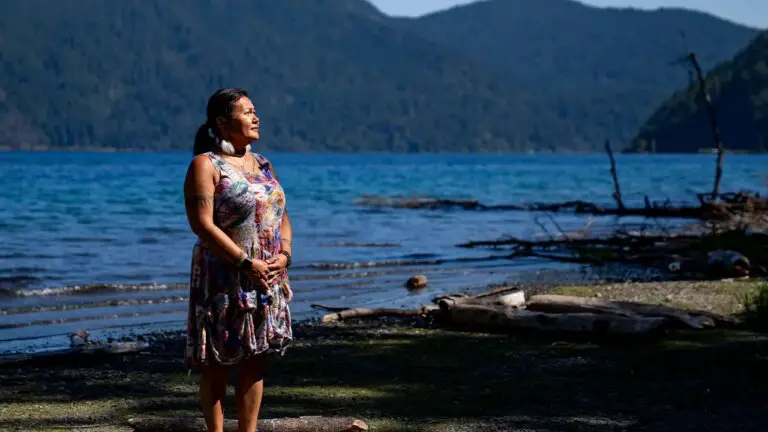Tribal Climate Camp Unites Indigenous Communities Against Climate Impact
At the edge of the Salish Sea, Jeanette Kiokun, tribal clerk of the Qutekcak Native Tribe in Alaska, discovers a weathered, brown plant. Uncertain of its identity, she turns to her peers at a tribal climate camp for answers. Here, amidst concerns of climate change, rosehips – traditional elements in teas and baths for the Skokomish Indian Tribe – gain recognition. These gatherings provide a crucial training ground and community space for tribes grappling with climate change.
Amidst the intensifying impacts of climate change, indigenous tribes in the U.S. often find themselves with limited resources to respond. The climate camp, a weeklong event, becomes essential in their fight against these challenges. Representatives from 28 tribes participated in this year’s camp in Port Angeles, Washington, while over 70 tribes have attended similar camps since 2016, organized by the Affiliated Tribes of Northwest Indians.
Experts and tribal leaders shared knowledge at the camp, covering diverse topics such as combating ocean acidification with clam gardens and restoring salmon runs in the Elwha River. Additionally, they learned how to utilize federal funds for climate-related initiatives and also dedicated time to cultural practices like cedar weaving to cope with the stress of climate change.
The camp acts as a platform for knowledge exchange among tribes. This concept of sharing is rooted in history, as native tribes once had trade routes across North America. This camp represents a revival and extension of this tradition, as tribes unite to face the challenges posed by climate change.
For Jeanette Kiokun, who works as the tribal clerk for the Qutekcak Native Tribe, last year’s camp bore fruit. After a landslide in 2022 disrupted their community, they joined forces with other tribes in the Chugach region to address climate change. The group now strives to secure a grant from the National Oceanic and Atmospheric Administration to restore fish habitats and collaborate with federal agencies on climate issues.
Participants at the camp range from newcomers seeking strategies to combat climate change to those with established plans. The Jamestown S’Klallam Tribe from Washington, who joined last year, already hired a climate-focused staff member, adopted solar panels, and even initiated a friendly competition for carbon neutrality with the Confederated Tribes of the Umatilla Indian Reservation.
The urgency of this year’s camp increased due to federal funding of over $720 million designated to help tribes tackle climate change. However, the complexity of navigating these opportunities can overwhelm tribal staff managing multiple responsibilities. The training at the camp helps tribes identify effective strategies and energy-saving methods.
As the camp concluded, each tribal team presented their ongoing projects and discussed the climate change impact. The Confederated Salish and Kootenai Tribes from Montana, early adopters of a climate response plan, openly shared their insights, promoting a spirit of collaboration.
The camp’s significance extended beyond just projects. Michael Durglo Jr., chairman of the climate change advisory committee for the Confederated Salish and Kootenai Tribes, emphasized the value of sharing knowledge: “You don’t have to steal it, it’s yours.”
With new determination, the Qutekcak Native Tribe plans a youth climate camp in Alaska. Jeanette Kiokun, stirred by the experience, remarks, “I think I’ve found a new passion.” As tribes continue to unite against the impacts of climate change, these camps foster not only adaptation strategies but also a profound sense of community.

